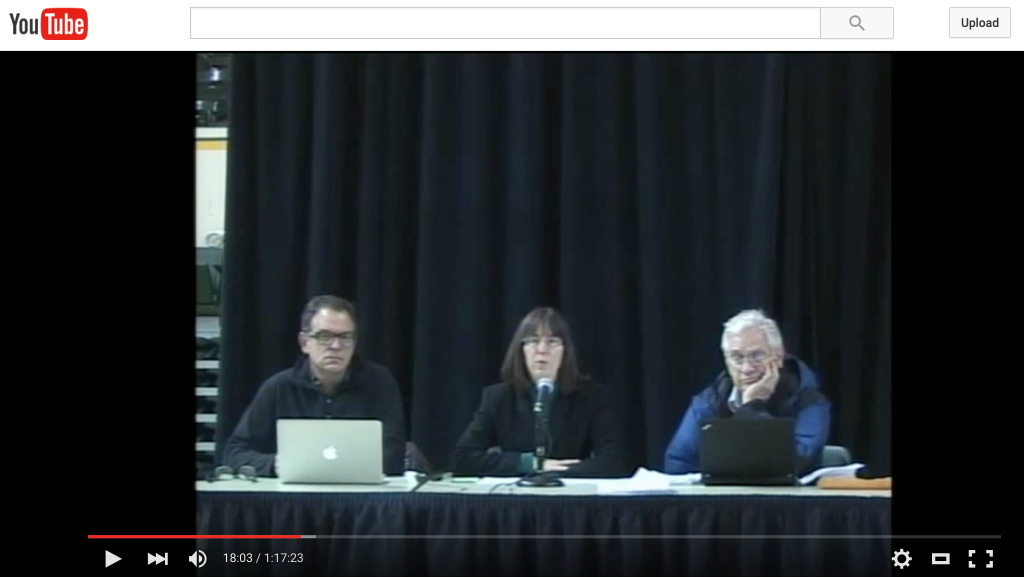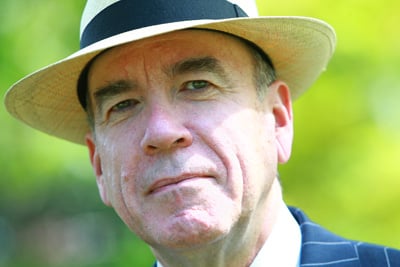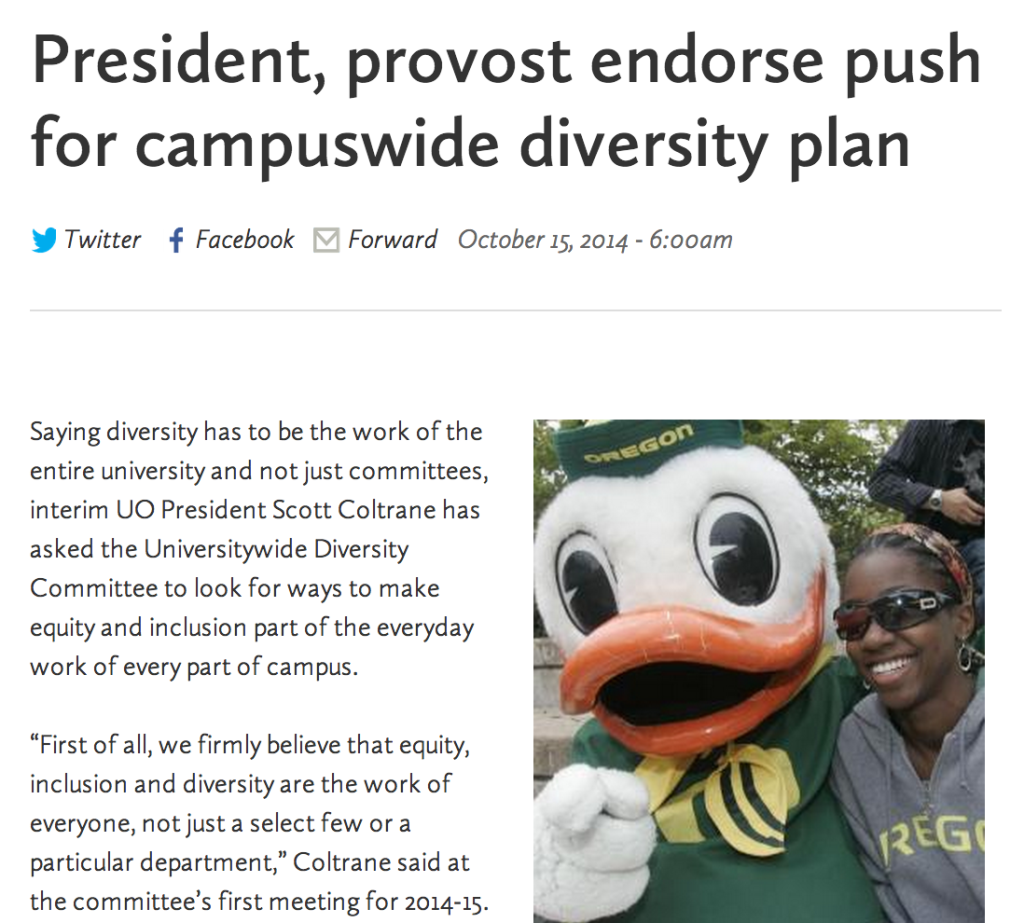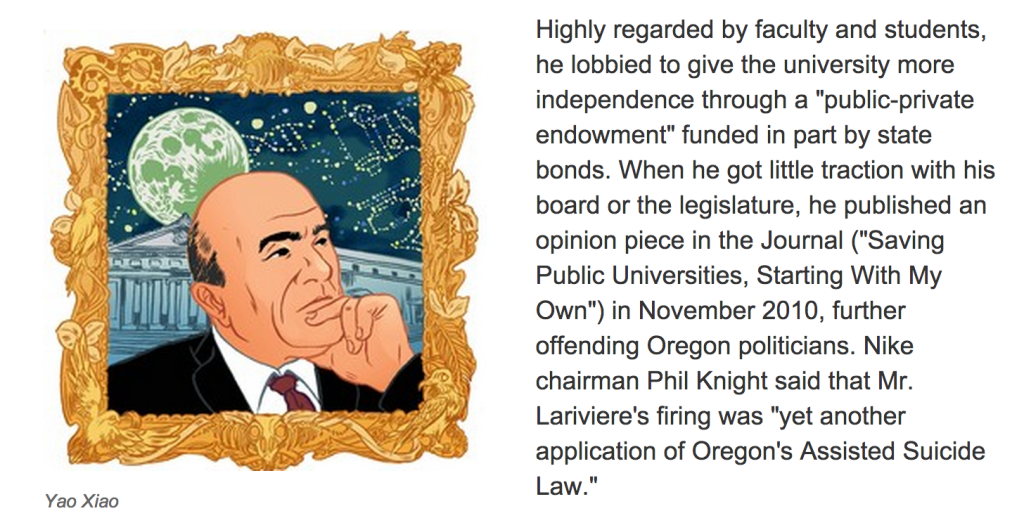Break out your hats and mark the day. On November 21st 2011, three thirteen years and four five six presidents ago, OUS Chancellor George Pernsteiner and Board Chair Matt Donegan came down to UO with their ultimatum demanding Lariviere resign for trying to implement his plan to bring faculty pay…
Posts tagged as “Lariviere Firing”
Sorry, long post, which includes a letter on internal threats to the principle of shared governance from Professor Emeritus of Biology Frank Stahl, and information on the 2012 threat from the administration to dissolve the UO Senate and Faculty Assembly. Five years ago on Dec 15th 2011 the UO Faculty Assembly ratified…
December 15 is UO Constitution Day. The UO Constitution lays out the division of responsibilities between the UO President and the UO Faculty, and the procedures for resolving disputes. It was adopted by the UO Faculty Assembly on December 7th 2011, and signed by UO President Richard Lariviere on December 15th.
In honor of the event I am posting a history of the Constitution, from the pseudonymous “Old Man”. As prelude, here is the video from the Assembly meeting. The introduction by Senate President Robert Kyr (Music) is followed by Susan Gary (Law), John Bonine (Law) and Peter Keyes (Architecture) giving excellent explanations of what the constitution means:
I had no involvement in writing the constitution or its adoption. I would appreciate it if those who did would post comments and corrections.
The History of the UO Constitution
(and the Policy on Policies)
as Recalled by the Old Man
Introduction: This document recounts the loss of the University’s century-old tradition of faculty governance, enshrined in its Charter, and events leading to its recovery through the creation and adoption of the Constitution of the University of Oregon.
University of Oregon Charter
“The President and professors constitute the faculty of the University, and, as such, shall have the immediate government and discipline of it and the students therein…”
Oregon Revised Statutes (ORS) § 352.010; originally section 14 of Law No. 9, Oregon Laws 1876
The Good Old Days
9/25/2015: Rumor down at the faculty club is that Richard Lariviere is back in town for a few days. After today’s events, it must seem like nothing’s changed. Maybe he’ll give Mike Schill some advice about how to deal with the UO General Counsel’s office.
9/18/2015: Governor Brown releases Kitzhaber emails on Lariviere firing
11/4/2014 update: UO Auditor to investigate Affirmative Action waiver for Triplett hire
The UO administration spends millions on promoting student and faculty diversity. But will it follow the law when it comes to hiring Johnson Hall administrators? UO’s new Auditor is going to look into it:
From: Brenda Muirhead <brendam@uoregon.edu>
To: William Harbaugh <harbaugh@uoregon.edu>
Subject: RE: PR request, AAEO documents
Date: November 4, 2014 at 3:47:51 PM PST
Bill,
Thank you for the email yesterday. I will review this case and determine if a request to waive a search was appropriately approved for this position. If you have any questions about the fraud and ethics reporting process, please don’t hesitate to contact my office at 541-346-6541.
Brenda Muirhead
UO Office of Internal Audit
11/3/2014: UO violated Title VII in Asst VP of Collaboration hire, according to Public Records Office:
Title VII is the section of the 1964 Civil Rights Act involving hiring, generally known as “affirmative action”. UO’s affirmative action policies require basic good hiring practices such as an open search and public job announcement, or an explanation for the exception. I’m no detective, but I think this evidence that UO violated its policies in hiring its new Assistant VP for University Initiatives and Collaboration is called “the dog that didn’t bark”:
From: “Thornton, Lisa” <pubrec@uoregon.edu>
Date: October 16, 2014 at 12:14:09 PM PDT
Subject: Public Records Request 2015-PRR-076
10/16/2014
Dear Mr. Harbaugh-
The University does not possess records responsive to your request made 10/06/2014 for “documents related to the job search for the new UO Assistant VP for University Initiatives and Collaborations… [s]pecifically I am requesting any documents showing exemptions or exceptions to the UO job search procedures”. [The full request is below].
The office considers this to be fully responsive to your request, and will now close your matter. Thank you for contacting the office with your request.
Sincerely,
Lisa Thornton
Office of Public Records
University of Oregon
Office of the President
Presumably Ms Thornton and Dave Hubin have already brought this potential non-compliance with state and federal affirmative action law to the attention of Interim General Counsel Doug Park, for swift investigation and appropriate remedial efforts. But just in case, I have cced Park on the notification – at the risk of another set of retaliatory emails from him, accusing me of harassment.
10/16/2014: Administration kicks off diversity plan by hiring new AVP without an affirmative action search
“Around the 0” has the latest window dressing, here:
Sounds great. So, did they do an affirmative action compliant search for their latest Assistant VP hire? Doesn’t seem likely:
Subject: Re: PR request, AAEO documents
Date: October 15, 2014 at 11:04:18 AM PDT
To: Lisa Thornton <pubrec@uoregon.edu> Cc: doug park <dougpark@uoregon.edu>
Dear Ms Thornton
It’s been more than a week since I made this PR request. I would appreciate it if you could let me know when you expect to be able to provide the documents.
On MondayOct 6, 2014, at 3:19 PM:
Dear Ms Thornton –
This is a public records request for documents related to the job search for the new UO Assistant VP for University Initiatives and Collaborations, announced here: http://around.uoregon.edu/content/uo-gains-statewide-education-system-expertise-latest-hire
Specifically I am requesting any documents showing exemptions or exceptions to the UO job search procedures explained at http://ups.uoregon.edu/content/new-appointments and http://ups.uoregon.edu/content/interim-recruitment-guidelines-unclassified-personnel
I believe that this search and hire may have violated UO policies and procedures, and Oregon and Federal affirmative action hiring laws, and therefore I ask for a fee waiver on the basis of public interest.
10/1/2014: Chuck Triplett, who helped Pernsteiner fire Lariviere, now works in JH
According to today’s WSJ story, Richard Lariviere is busy. But you know the UO Trustees want him, or someone like him, to lead UO. And I’m guessing that plenty of the 6700 faculty, staff, alumni and boosters who signed the petition to protest the 2011 firing of Lariviere are telling UO’s new Trustees that a timid paper pusher like Gottfredson is not what they want:
But first we’ve got to get rid of the interminably passive-aggressive Mike Gottfredson:
5/19/2014 update: Why Mike Gottfredson will be resigning as UO President
11/20/2013: Hannah Hoffman of the Statesman Journal has a report on the latest goings on with the legislature and the UO Board of Trustees appointments, here. For more perspective, read Mrs. Gerlinger’s prescient 1939 letter, here.11/15/2013: OUS Board celebrates “Remember the Hat” day They’re a little early this year, and boy…
10/14/2013: Those who sat through the Lariviere firing meeting up in Portland will remember the gutless Jim Francesconi filing into the bathroom with Pernsteiner to do the deed in secret. He now sees his main chance in the resignation of Jeff Cogen after a sex scandal. In the announcement, Francesconi…
10/2/2013: Updated announcement with links. I apologize but we do not have a budget or dues rate yet. Nothing nefarious, I’m traveling and the OC is busy with the contract and classes etc. Hard to arrange a meeting time to approve everything. I’d post the draft but I’m just one of…
9/16/2012: It’s a long and complicated story, the Andrew Rice article is very comprehensive, I’m not going to even try and synthesize it just now. The issue has many other interesting education articles as well, e.g. this one on computerized tutoring. Comments welcome.
here. For contrast Larivere’s is here. I don’t see a clause preventing Gottfredson from pursuing the New Partnership – but Pernsteiner’s board does reserve the right to fire him on 30 days notice, without cause. Page 6. Wow. But even Lariviere’s first contract had something similar, as does Pernsteiner’s. BTW –…
Kevin Kiley of IHE has the story, read it it all: “[The Oregon state board] can say, ‘For the good of the system, the matter is closed,’ “ Kyr said. “But it can’t say ‘We did this for the good of the university’ without extensive prior consultation with the faculty,…
of UVA. From The Hook: In his remarks prefacing his reinstatement resolution, Fralin conceded that all Board members possessed advance knowledge of the desire to remove the president. He says he regrets that he wasn’t “clever enough” to know that he and just two other board members could have called…
6/22/2012: Insidehighered is keeping a close watch on developments at UVa, here. Looks like the board may cave to intense faculty pressure and reappoint President Sullivan. The last graph makes clear how rare faculty input into independent boards is: Presidents have to make controversial decisions that can alienate campus constituencies.…
6/19/2012: The NYT reports on Dragas’s firing of UVA Pres: The board’s united front showed its first serious cracks, as four of the 15 voting members sent an emissary on Sunday night to the president, Teresa Sullivan, to discuss the terms on which she would stay, according to people briefed…



